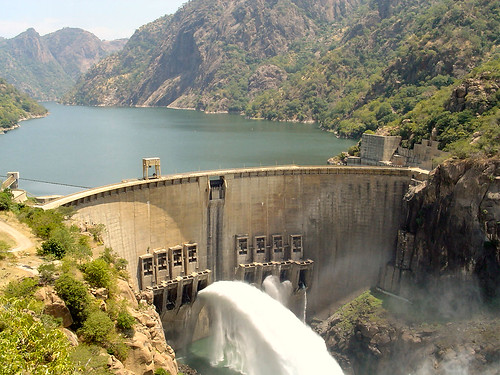
Cahora Bassa Dam in Mozambique. The dam provides power to sections of neighboring Zimbabwe., a photo by Pan-African News Wire File Photos on Flickr.
Renamo bandits living in a time warp
November 5, 2013
Opinion & Analysis
Zimbabwe Herald
The return to the Mozambican bush by some misguided, and rather inane, elements of Renamo obviously requires the Zimbabwean military to be on alert, as Defence Minister Sydney Sekeramayi, last week assured us all, but there is no need for panic. The circumstances are entirely different from the 1980s when the apartheid regime in South Africa, during its last and most vicious years in power, was pumping arms, money and trainers into Renamo as part of its major effort to damage the Frontline States that they would be in no condition to help the ANC in its struggle against that same regime.
This time there appears to be several hundred armed men who have mutinied against the lawful Mozambican government.
But there doesn’t seem to anyone backing them. When their ammunition runs out, they will have no more; when their weapons break, there will be no one to fix them; when they need money, food and clothes, there is no one to give these.
The Mozambican defence forces are in far better shape than they were a quarter century ago. So we have a far better army facing a far weaker enemy. And Mozambique is not alone.
If the threat grows in any way, all that the Government of that country has to do is invoke the Sadc treaties and help comes, with South Africa this time on the side of the good.
So far the Mozambican authorities seem confident that they can deal with what amounts to a large gang of armed robbers, but if they have underestimated their enemy they will find Sadc support.
Renamo was a creation of the Rhodesians, largely put together from remnants of the Portuguese equivalent of the Selous Scouts and designed to gather intelligence on Zanla camps, logistics and operations and to be a nuisance to the Mozambicans.
At Zimbabwe’s independence, it was handed over to the South Africans, who turned it into something else: far nastier, far larger and far better armed.
But in the end it was defeated, although admittedly Zimbabwe had to deploy two brigades to defend its routes to the sea, and give some support to the Mozambican forces as they built up their offensive capacity.
Eventually it was the apartheid lords who lost power; the peace deal came as South Africa started moving fast towards democracy and Renamo realised that it had to quit while it still had something to surrender.
Believing their own propaganda, many in Renamo thought they could win at the ballot box. Well they lost there too, in elections declared free and fair by a wide range of observers, and they have done no better since.
As Mozambique continued to develop economically and move steadily towards a more stable plural society, it became obvious to everyone that if another party was ever to beat Frelimo at the polls, it was certainly not going to be Renamo.
For a start an alternative governing party would need a sophisticated economic and social programme, have decent patriotic credentials, and have a leadership with moral and intellectual authority.
Renamo scores very low in all categories.
So those equating the present day with the 1980s are making a serious error.
Having several hundred armed robbers on the loose is not something that any country welcomes; but that is all it is this time, just a large mafia gang running wild.
It is not a major terror campaign backed by a powerful and implacable neighbour.
We ourselves are confident that Mozambique probably can deal alone with this threat, but we are sure Sadc will help if needed, and help promptly. But even the alerts on borders help, and we presume that Zambian, Malawian, Tanzanian and South African troops are also on their borders, since they can prevent Renamo from escaping and help contain the threat.
No comments:
Post a Comment